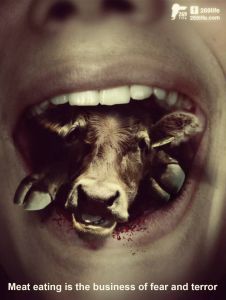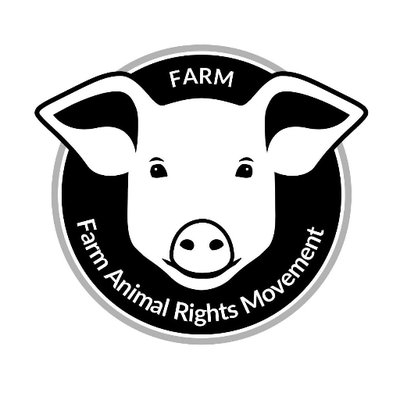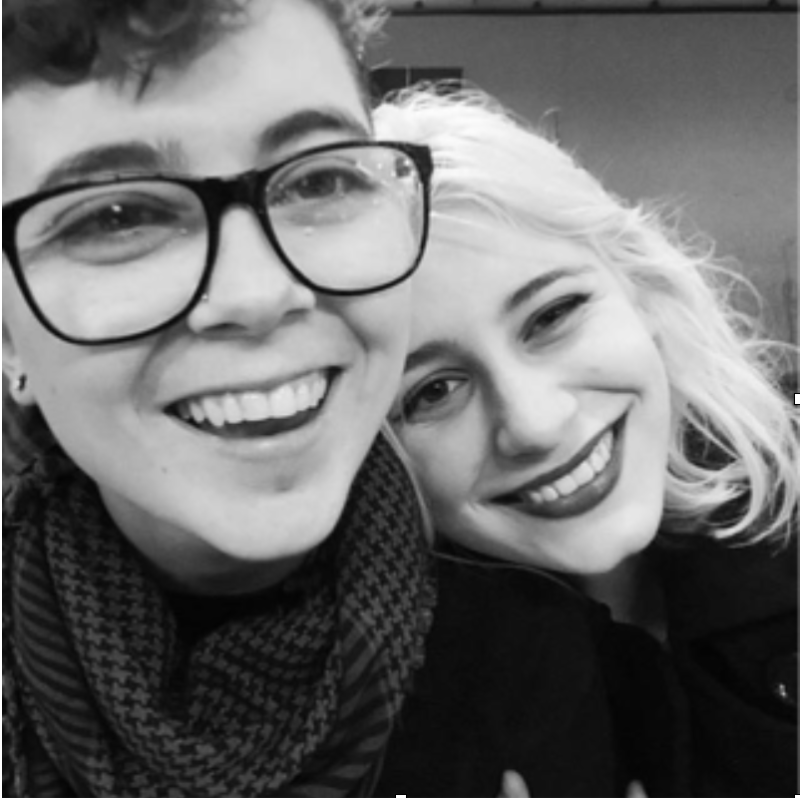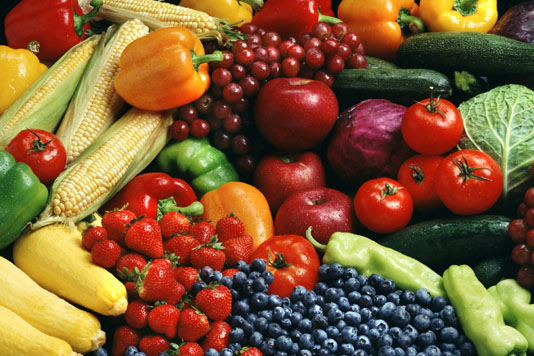Introductory Note from ChiVeg:
Since I have been a vegetarian for 12 years, it is pretty much second nature for me to not look at the meat options on menus or purchase dead animals at grocery stores. I also am employed full-time and can afford to eat vegetarian without going broke. Many students tell me that they’d like to adopt a plant-based diet, but can’t afford to or don’t have the time to given the egregious cost of higher education in this country and the lack of social support. They also have demanding schedules where they have to balance their academic commitments with extracurriculars and on/off campus jobs.
I thought it would be interesting to hear a perspective from a young college student who is more recently going through the transition to a plant-based diet. Sydney Mudd, is a philosophy student (an incredibly intelligent and gifted former student of mine) who has applied his knowledge and understanding of ethics to his choices as a consumer and human being. In this blog post, Sydney shares his journey to a plant-based diet while being a broke and busy college student. Read below to see his words of wisdom.
How a Young College Student Transitioned to a Plant-Based Diet
– Written by: Sydney Mudd
As a general disclaimer, I do not fully identify as a vegetarian because my switch to being completely vegetarian and plant-based is still in progress. Lifestyle changes simply do not happen overnight. With many other lifestyle changes I have made over the years, changing my dietary habits has been slow, which, I must add, benefits me tremendously because it always gives me adequate time for self-reflection. Moreover, going at a slow pace helps me to truly let go of the habits so that I won’t re-acquire them in the future.
The reason that I added this disclaimer is because there are times when I do decide to eat meat. Now, I am much more conscious of my choice to do so. I would say that I eat meat about once a month because sometimes I am able to selfishly justify eating meat. As time progresses, though, I find myself wanting meat less. Furthermore, I am becoming less satisfied with meals that I once loved (that I never imagined being able to give up!).

What did I eat before?
Meat and dairy were staples of my diet. My parents passed on the false notions of nutrition they learned as children onto me. In conjunction with health classes, and the so-called ‘food pyramid’, I was blind to the reality of nutrition by my socialization. As kids, we are told that you need to eat meat and drink milk in order to ‘be strong’ and ‘have strong bones’. No one bothers to tell us how harmful those products are because in a capitalist society profit, rather than ethically selling products, is the most important aspect of business.

I remember seeing ads like this on the walls in my school lunchroom.Photo originally from: bodybymilk.com
Another staple of my diet was processed foods, or should I say ‘junk food’. I also ate fast food from places like McDonalds, Burger King, and Taco Bell. For me, I always thought of food in relation to how good it tasted rather than its nutritional value; it gave me some sense of comfort, in both good and bad times.
I have always been an active person and I was even more so as a child. Due to my active lifestyle as an athlete, paired with a high metabolism, I was never able to see the direct negative effects of the food I was eating (i.e. weight gain, high cholesterol, etc.). Although looking back, I’m sure I would have performed better in school and sports as a child if my dietary habits were healthier.
Catalysts for change:
As I grew up, my eating habits remained the same but started to affect me differently, as I had internalized societal standards of female beauty, particularly the aspect of being skinny. The way that we are told to be skinny, thanks to the media, is to control our food intake. Unfortunately, the way that I controlled my food was not through eating a healthy, plant-based diet but by binging and purging.
When I was 16-19 years old, I suffered from bulimia, which is when an individual intentionally throws up all of the food they ingest. It gave me a false sense of control and ownership over myself. I got to decide what I would put in my body, what I would let stay in my body, and what I would purge. I let myself believe that it did not matter what I ate as long as I threw it up so that my body wouldn’t digest and absorb the fat in it.

Taking steps to learn how to deal with my eating disorder was the first catalyst to change. Through the process of overcoming bulimia, I had to learn what foods triggered me to purge. After a couple months, something had become glaringly apparent to me: ‘junk food’ and fast food were my biggest triggers.
I think subconsciously I was aware of the harm I was inflicting upon myself by putting those foods into my body. So, I began to cut processed foods and fast food out of my diet and eat more plant-based. I still ate meat and dairy products, though.
Then, when I was around 19 year old, I had the wonderful opportunity of taking an environmental biology class. Throughout the class we learned about a plethora of different things, one of which was sustainability. We learned about how many resources are wasted in animal agriculture; in order to raise animals we must use exponentially more resources, such as water and corn.
Not only must we use more resources, it is also less efficient on a biological level for humans to consume meat instead of raw resources. Plant-based diets are a more efficient way to absorb nutrients because you are consuming them from the primary source or energy (or the producer) rather than a secondary, tertiary, or quaternary source. In other words, when an animal such as a cow eats, they only absorb a percentage (about 10%) of the nutrients and energy within their food. Then, once a human eats cow meat, they consume a small percentage of the nutrients from the primary source. Therefore, it makes more sense to simply consume the producer in order to absorb the max amount of nutrients and energy.

For me, that was easy enough to understand but that didn’t mean I had to completely cut meat and dairy products out of my diet. Instead, based on that information, I concluded I just had to eat less. That was, until I was exposed to campaigns run by organizations such as Vegan Outreach, Compassion Over Killing, and Farm Animal Rights Movement.

Their mission, from my understanding, is to make people more knowledgeable about the unethical methods of farming practiced within animal agriculture. I watched dozens of videos documenting the unsanitary conditions and inhumane means of killing the animals. I also read various pamphlets of information about the industry.
That information really struck a cord within me. Some people like to think that the way our meat is processed doesn’t directly affect them. That’s okay, I guess. But for me, I couldn’t get over the fact that millions of sentient beings were suffering to such a large extent. It was that information, more than anything else up to that point, which pushed me to reconsider consuming meat and dairy products because it made me think of my diet in a less selfish way. I immediately started to eat less meat and dairy products.

Photo from: 269 Life
As time progressed, and I continued to eat less meat and dairy products, I ended up taking another influential class. This time, it was an ethics course (taught by the wonderful ChiVeg, herself!). In the final portion of the class, we began reading about and discussing the ethics of animal agriculture, factory farming, and the fast food industry. Thanks to that course, I acquired a more holistic understanding of those industries insofar as I became more aware of the ways that they exploit the farm animals, the environment, and the already marginalized people within society.

We read sections of this book in the ethics course.Photo from: Wikipedia
The environment is being exploited by the factory farming industry due to the inefficient use of land and the improper distribution of animal waste. One of the most disturbing things I learned was that factory farms spray the animal feces in the air to get rid of it, directly affecting the people living near the farms; which are purposefully located next to poor communities of color because those communities are the least able to fight back against their practices.
The workers within those industries are being exploited because they are being forced to work in unsafe conditions with inadequate benefits and are pressured not to unionize. Moreover, a large number of the people targeted by factory farms are undocumented because they already have few rights, if any, to begin with.

Based on what I learned, it was clear to me that being vegetarian was not simply for the animals. Rather, by choosing to live in that way, in all facets of my life, I am not only helping to alleviate animal suffering, I am taking a stand against the exploitation of marginalized human beings and the environment.
Final Section:
One aspect of my transition to plant-based eating has been cooking more. My girlfriend Gaby and I like to cook meals together whenever we get the chance. When we do cook, we try to make meals that we made in the past with meat, with meat substitutes instead. For instance, we used to make Taco Bell Crunchwrap Supremes at home with beef; although we have not done it yet, we plan to use meatless ground beef the next time we make it. In addition to getting creative with dishes that originally have meat in them, we also try to make various dishes from vegetarian or vegan food blogs we have found online.

Thanks to living in the age of the Internet, we have easy access to so much information, including how to cook vegetarian/vegan/plant-based! Lastly, I was gifted a vegan cookbook (by Chiveg!), Thug Kitchen: eat like you give a f*ck. That cookbook is awesome because it has amazing recipes and a plethora of advice for ‘eating like you give a f*ck’.
Since I have a job I try to put aside money to pay for my own groceries. In some ways, it helps me feel like I have more agency over the food that I eat; it also makes me appreciate it more. As much as I would like to, since I have limited funding I cannot always afford the most ethical plant-based options. I have to buy non-organic a lot of times because, unfortunately, it is cheaper. I eat so many more vegetables, raw and cooked, now.
Moreover, I eat more rice and pasta than I used to. I also eat my fair share of hummus. Overall, I eat more plant-based food items rather than processed, unhealthy food (although I still indulge myself in those items).

Thankfully, over time, my parents have noticed that I have changed my dietary habits. Since I am lucky to have parents who graciously support me, my mom tries to buy more fruits and vegetables for me when she goes shopping. The rest of my family still eats meat but while my mom makes dinner for everyone, I make myself dinner; that way I can still eat dinner with them but avoid eating the main part: meat.
Another aspect of my journey has been choosing vegetarian or vegan options when going out to eat. I am the type of person who, when eating out, finds a meal that I like and then generally sticks to that every time I eat at that particular restaurant. So, switching to a more plant-based, vegetarian diet has led me to leave behind old options and try new ones. Not surprisingly, the meals I eat now are more balanced and flavorful.

It has been difficult finding ethical restaurants to eat from. I like places with vegetarian options but they still sell meat and dairy products. So, even though I am eating meatless I am still supporting the larger industry and the wider system of capitalism. Unfortunately, I am a young, broke college student so my options are very limited at the moment.
When I have the money and time I like to visit vegan restaurants in Chicago like Veggie Grill (located in the Loop) or the Chicago Diner (in Boystown). When I am in the suburbs I like to eat out at Chipotle, Pita Inn, Naf Naf Grill, or Mod Pizza. Although these restaurants serve meat, from my understanding, they are on the more ethical side in regards to where they buy meat and produce.


Advice I have for other young people trying to eat change their diets:
1) Becoming a full-time vegetarian is not the easiest task. With that being said, it certainly is not the most difficult. It is 100% worth the effort, though. Changing my eating patterns has been one of the ways I have increased my vibration and raised my consciousness. I feel so much healthier in mind, body, and spirit than I used to a few years ago.
2) Take the time to educate yourself. Not only about plant-based food options but WHY you should eat that way in the first place. A huge part of why I changed my eating habits, as I hope is apparent throughout this post, was due to the things I learned about factory farming, the fast food industry, and the environment.
3) Remember, that you don’t have to completely cut it out of your diet from the start. Simply choosing meatless options is a good start. By reducing the amount of meat and dairy products you eat, you are still making an impact and sending a message.
The past few years of my life have consisted of an immense amount of self-reflection, education, and soul-work. I can only imagine what I will feel like in the future as I continue to change the way I eat.

- If you’d like to contact Sydney, please email him at: sydneyrmudd at gmail.com



Recent Comments